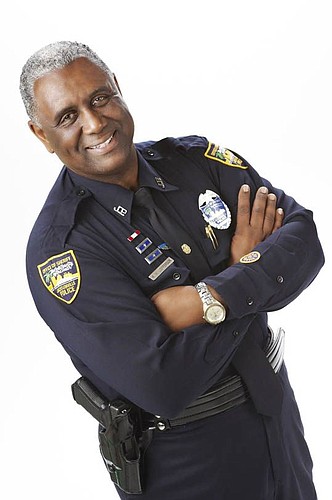
Ken Jefferson could have been one of the kids in his generation lost to a life of violence and crime. Those who spent their lives trying, but often failing, to stay one step ahead of police.
He grew up in Washington Heights Apartments on Moncrief Road, where he and his six siblings shared a two-bedroom place with their parents.
He was one of the lucky ones, coming from a stable, loving family. His father worked two jobs, leaving his mother to be the “strong tower of the house.”
But, Jefferson got into a lot of fights as a kid and remembers being pushed around by bullies who would throw his school books in the woods. He’d have to wait until it was dark and the bullies were gone to run back and get his books.
His life could have gone either way, until the day a young police officer with a commanding presence walked into Jefferson’s fifth-grade class. It changed everything.
Marvin Young started talking about the role of a police officer in a community. Not the role of arresting people but one of showing how officers defend people who can’t defend themselves. The role of making senior citizens and children feel at ease because police are there to protect them.
“I raised my hand and said, ‘That’s what I’m going to be,’” Jefferson recalled.
That life-changing moment came through the now-defunct Officer Friendly program, something Jefferson plans to bring back if he is elected Jacksonville sheriff.
That will be one of the ways Jefferson works to make sure another generation isn’t lost to violence and crime.
His pledge to cut violent crime, drug crimes and gang activity by 25 percent in his first year features a mixture of resurrecting programs like Officer Friendly and adding new approaches. Like a street crimes unit that will be sent into high-crime areas in need of additional enforcement. And using CompStat analysis software to analyze when and where crimes are happening and to respond accordingly.
Jefferson said the “intelligence-led policing” approach was used by Camden, N.J., where officials said it cut violent crime by 50 percent in 24 months, though Jefferson thinks it was actually 34 to 35 percent.
He also plans to reinstate the community policing approach used by former Sheriff Nat Glover, as a way to “reintroduce the department back to the community.”
The backbone of the approach is getting officers to build trust with residents in the areas they cover. To get out of their cars and get to know people in neighborhoods. And to be a regular presence, not just when responding to a call.
Jefferson said a recurring theme he’s heard during his walks in the city is people want to feel relevant to the sheriff’s office. And they don’t want to be forced to stay inside when it’s dark outside because they don’t feel safe.
“That is no way to live,” Jefferson said.
He’s stayed overnight in several high-crime areas, using the time to gain trust and valuable information from residents. During a recent visit to Grand Park, he had a relative of a gang member provide names of gangs and gang leaders.
“Had I not been there, I never would have gotten that information,” he said.
Jefferson knows he needs more officers on the streets, but that doesn’t necessarily mean hiring new members.
He plans to change the current shift schedules, which have officers working shifts of nearly 12 hours for five days, then being off four days.
He will go to shorter shifts, which he said would have officers actually working more days, providing greater flexibility to move them around to respond to trends.
He also thinks a restructuring could put up to an additional 20 officers on the streets.
Jefferson won’t immediately ask to replace the 147 officers the department has lost over the years. He wants to first implement his plans to see if the 1,600 officers are enough to get the results he wants.
If not, he said, then he will go to City Council and request additional staff.
Jefferson also will start a mentoring program for children ages 9-12, using help from nonprofits, the faith-based community, the military and other groups. He has committed to mentoring a child for an hour a month and said his senior staff will do the same.
The program, he said, will teach the young people to respect authority, how to resolve conflict and teach them values. To show them what leadership is about.
All key to his pledge to not lose another generation.
@editormarilyn
(904) 356-2466